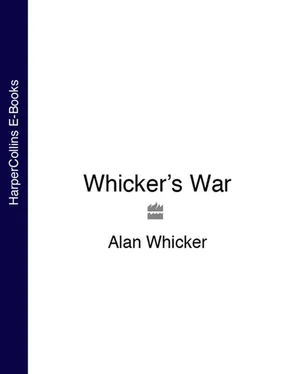Came the war and I enlisted and was brushed by glory and instant power when made a Local Acting Unpaid Lance Corporal. Sewing on the lone stripe was a significant moment, rather like the ecstatic sight of that first bicycle. (I can still see mine leaning against the garden fence, all chrome and gleam. Compared with such utter bliss the sight of my first Bentley was as of dust).
I joined-up at the vast Ordnance Depot of Chilwell, outside Nottingham, and was selected as possible infantry officer material, which was worrying enough. The war had not been going well for us, and a moment’s reflection would have warned me that if I wanted a long and happy life, the infantry was not the way to go.
In pursuit of that hazardous promotion, I drove north with my friend Harry Hamilton. He had a Ford Anglia and a hoarded petrol ration. Along almost deserted wartime roads we headed for Carlisle Castle and a Border Regiment training course which would find out whether we were the right kind of cannon fodder. With a hundred potential officers we shivered through an icy January in two vast Crimean barrack rooms, sleeping on iron bedsteads and queuing to unfreeze a couple of taps. The wind whistled against cracked windows in a scene Florence Nightingale could have drifted through, the Lady with the Lamp looking concerned about her poor boys.
Ham struck a considerable blow for comfort and the conservation of life by chatting-up to some effect a girl who owned a downtown snack bar. There behind gloriously steamy windows we repaired for warmth and consolation from Army life which seemed exactly the way it was in those boys’ adventure books: cheerful, but horrible.
As we were shivering on parade one day the Sergeant’s arm came down between Ham and me – and his half of the squad turned left and marched towards the Officer Cadet Training Unit at Dunbar in Scotland. The rest of us turned right and headed for 164 OCTU at Barmouth, North Wales. We did not meet again until after the war, when he was married (‘I thought I was going to be killed and I wanted someone to be sorry’) and I was godfather to his first son. From then on our lives diverged even more as he kept marrying, and I kept not.
In the months of tough training which followed, the natural splendour of Merioneth never got through to me. A mountain merely meant something to run up with full pack, or stumble around cursing on a night exercise. A river was to wade through, a sun-dappled rocky chasm a place to cross while balancing on a rope, white with fear. It was not until I returned to Dolgellau and Cader Idris after the war that I realised I had lived, head down and fists clenched, amid scenic magnificence.
Among Army skills which remained with me for life … was how to avoid riding a motorcycle. I tried to manoeuvre my powerful beast up a one-in-two cliff path outside Harlech while the instructor insisted I stall the monster at the steepest point and then restart without losing equilibrium. That heart-bursting morning on a Welsh hillside wrestling a ton of vicious machinery to the ground put me off motorbikes for life. I have never ridden again. This must have spared me countless broken collarbones and torn ligaments. No experience is all bad.
As officer cadets, we were lorded-over on parade by the regulation Coldstream Guards regimental sergeant major straight from Central Casting: an enormous, bristling ramrod with foghorn voice. On our esplanade parade ground he spread terror and doubled platoons smartly into the sea and out again, sodden. Every day I tried to convince myself that, beneath it all, he was a dear old thing who loved his mother – but it wasn’t easy. He put me on several charges for being lazy, unsoldierly and dreaming on parade. All these heinous offences were justified, though none was pursued or I might have suffered the ultimate disgrace of being RTU’d (Returned to Unit – who said the BBC invented initials?)
I also relished one unexpected moment of glory which redirected and established my military future. I had foolishly allowed myself to be badgered into volunteering to represent my Company at boxing – a lunatic decision deeply regretted at leisure. On the night of the execution I climbed reluctantly into the floodlights of Barmouth’s packed town hall and glumly noted in the opposite corner a glowering opponent the size of a gorilla. This was a light -heavyweight? Around the ring – a place of blood and tears – sat the massed ranks, and the Unit’s excited ATS girls. They were probably knitting.
I considered how to avoid total disgrace before the brass watching from the surrounding darkness who could make or break my military career. I had to forget all that stylish and gentlemanly dancing around, the Queensberry finesse and keeping-your-guard-up I had been taught in the school gym, but to tear into him regardless and go down swinging. At least he would finish me off quickly – and I might even save disgrace by getting a crafty one in, on the way down.
So at the bell I leapt from my corner and hurled myself desperately at the gorilla in a frenzy of hopeless determination, arms going like a windmill. It was the least scientific approach in boxing history. Within ten seconds of our violent clash in the centre of that brilliant ring, my enormous opponent was lying unconscious at my feet. Never again in an uninspired sporting career was I to feel such surprise, or receive such applause.
When I recovered from my amazement I was suitably modest – as though that sort of thing happened all the time. The gorilla was brought round with difficulty and carried away through the ropes with impatient disdain, towards some tumbril. The ATS didn’t even bother to look up.
You can achieve quite a lot in ten seconds, and my reputation as a quiet killer with fists of iron spread through the unit. The Commanding Officer called me in to take a thoughtful look at this unexpected whirlwind in his midst. The girls in the Mess hall giggled at their mean street fighter and gave me larger portions, for Barmouth was a tiny coastal town miles from any excitement. Even the drill sergeants spoke to me approvingly – and that’s unnatural. The RSM shouted no deafening threats for several days, and the rest of the Company ‘D’ backed away politely when I approached the tea urn.
However, retribution was not to be avoided: the Finals were already being advertised. Next Saturday night my aggressive bluff would be called. I was about to blow my reputation on the biggest night of the sporting season before Judges measuring me as possible Officer material. I briefly considered desertion, but finally and with growing concern went reluctantly back to the town hall wondering which ferocious man-mountain would emerge to wreak terrible revenge upon an upstart pretending to be a boxer.
My seconds bravely urged their champion to Go In and Kill Him, whoever he was. They only had me to lose, and there were plenty more where I came from. Once again I climbed glumly through the ropes and towards the scaffold, into a brilliance where no secrets could be hidden. I knew that this time my tactics would be no surprise. I should have to dance-around like a pro, and box. There was a price to pay for all that limelight. I resolved to sell my life as dearly and quickly as possible, and then step back into the shadows again. Barmouth had an efficient little hospital.
I looked around anxiously for my nemesis. The stool opposite was empty – a stage-managed delay, no doubt, to increase the suspense. We waited. It stayed empty. The pitiless ATS, hungry for more blood, were getting restless.
It slowly dawned upon me that I had underestimated my own publicity. My opponent, evidently a man who believed what he heard, had Gone Sick. His strategic withdrawal on medical grounds gave me a walkover. I received another ovation even more undeserved than the first and instantly retired from boxing forever, undefeated. Quit fast, is my theory, while you’re ahead and uninjured.
Читать дальше












